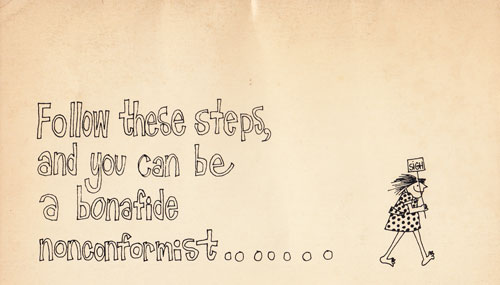
I just finished listening to a bunch of science fiction stories in rapid succession so that I could cast informed votes for the annual Hugo awards and post the reviews to my new blog.[ref]The Loose Canon is where I will do most of my future blogging about science fiction.[/ref] That done, I returned to some of the non-fiction audiobooks I’ve been waiting to get into, especially Redefining Reality: The Intellectual Implications of Modern Science. It’s been a fantastic spring day, and there was an exquisite, gentle evening breeze as I walked the dog. Meanwhile, Professor Steven Gimbel explained the impact of World War II on the field of social psychology:
In the first half of the 20th century, psychology had the luxury of debating whether a subconscious mind existed and whether scientific methodology required limiting the field of study to stimulus and response, but after the horrors of World War II, psychology changed… The specter of the Holocaust raised deep and troubling question about the human mind and its relation to authority… The reaction to Nazi atrocities in the scientific world is shaped by what are perhaps the three most famous psychological experiments: Stanley Milgram’s obedience study, Solomon Asch’s group think study, and Philip Zimbardo’s Stanford prison study. [ref]The quote is my own transcription, and I added the hyperlinks.[/ref]
I think Millgram’s and Zimbardo’s experiments are the most famous. At least, those are the ones that I’ve read about and seen the most. I was familiar with Asch’s study as well, but I haven’t seen it come up as often, and I was unprepared for how deeply a simple remark made by Gimbel would strike me. It hit so forcefully that I hit pause on the audiobook (to keep that thought forefront on my mind), came home, opened my laptop, and began this blog post.
In Asch’s study, participants were given a simple task. They had a reference image that showed a vertical line, and then another image that showed three vertical lines. One of the three matched the vertical line in the reference image, and all they had to do was pick out the correct match. They were asked to do this 18 times. The trick is that the participants were seated at a table with seven other people who were secretly in on the experiment. On the first two rounds, these seven individuals all gave the same answer, and it was the correct one. But on the third trial, these individuals all gave the same incorrect answer. Over the course of the next 15 trials, the seven plants gave the wrong answer 11 times, and in each case all seven of them gave the same incorrect answer.

So you’ve got eight people seated around a table answering a perfectly obvious question. Seven of them have just given the identical, incorrect answer. The point of the experiment was to find out what the eighth person–the only real subject of the study–would do. Given that this is considered one of the “three most famous psychological experiments” you can guess how it turned out even if you don’t already know: 75% of subjects went with the group consensus (even though it was obviously wrong) at least one out of the 12 times when the seven fake participants picked the wrong answer.
There are all kinds of interesting details to the study, especially when it comes to the rationales that the participants gave afterwards to explain why they had refused to go along with the group or why they had, at least some of the time, opted to go along with the group despite what was clearly true. But here’s what Gimbel said about the study that so arrested me:
Asch expanded the study to see what would happen. He showed that the bigger the majority, the stronger the pull to conform, but that if even one person dissented before the test subject, that the test subject was then more likely to voice his different view. Asch showed empirically that having someone else agree with you is a powerful tool in making people willing to take a contrary position. But, if that person [the test subject] were deserted by his fellow dissenter, conformity followed rapidly.[ref]I transcribed this quote from the audio and then added emphasis to the text version.[/ref]
Now, before I continue, I want to take a moment to explain that–contrary to popular opinion–I’m not interested in attacking conformity. Conformity gets a bad rap in movies like Dead Poet Society.
https://www.youtube.com/watch?v=SnAyr0kWRGE
The sentiment in that clip is hogswash. Unfortunately, so is most anti-non-conformity sentiment. There’s an entire guide to being a non-conformist, but–like all such ironic anti-non-conformity statements–the actual point is that non-conformity is bad because it’s a kind of conformity.


 So, even the anti-non-conformists are trapped in an non-conformity mindset. Conformity can’t catch a break. Which is a shame, because conformity is actually pretty important in helping to form human society and–because we are social animals–to form who we are as well.
So, even the anti-non-conformists are trapped in an non-conformity mindset. Conformity can’t catch a break. Which is a shame, because conformity is actually pretty important in helping to form human society and–because we are social animals–to form who we are as well.
In The Righteous Mind, Jonathan Haidt introduces this concept in a chapter called “The Hive Switch.” He starts with an example of exactly the kind of military drill (e.g. marching) that Dead Poet Society maligns, citing Wiliam McNeill (a World War II veteran) describing drill this way:
Words are inadequate to describe the emotion aroused by the prolonged movement in unison that drilling involved. A sense of pervasive well-being is what I recall; more specifically, a strange sense of personal enlargement; a sort of swelling out, becoming bigger than life, thanks to participation in collective ritual.[ref]The Righteous Mind, page 221[/ref]
After his service, McNeill studied this kind of conformity (which he called “muscular bonding”) and found that it “enabled people to forget themselves, trust each other, function as a unit.”[ref]The Righteous Mind, page 222[/ref] What works like Dead Poet Society miss[ref]And it is far from alone in this regard.[/ref] is that conformity is a path to collective consciousness. In the same chapter that begins with marches and drills, Jonathan Haidt goes on to discuss ecstatic mass dancing, awe in the presence of nature, hallucinogens, and raves. One of the roles of conformity, in other words, is to enable humans to access a “hive switch” that flips our identity from individualist to collective. The term “collective” often has negative connotations (like conformity itself), until one realizes that it also implies (as McNeill points out) selflessness and trust.

 Writing in The Origins of Virtue, Matt Ridley emphasizes a similar point. One of the grand puzzles of human nature is that–alone of all animals in existence–we have the capability to come together in large groups to work for collective goals without close genetic ties.[ref]Ant colonies and bee hives work together, but they are also all (effectively) siblings, and so there is no mystery here, genetically speaking.[/ref] In his book, he surveys a lot of literature on evolutionary psychology and game theory trying to explain why it is that human beings, in practice, are able to escape the prisoner’s dilemma. The prisoner’s dilemma is the most famous game theory scenario, and it proves that–if humans were strictly self-interested and rational–we would effectively never cooperate in large groups. And yet, we do cooperate in large groups. Is there any theoretically explanation for this? Yes, it turns out, there is. The only kind of society in which cooperative strategies can survive without being overwhelmed by cheating free-loaders is a conformist society.
Writing in The Origins of Virtue, Matt Ridley emphasizes a similar point. One of the grand puzzles of human nature is that–alone of all animals in existence–we have the capability to come together in large groups to work for collective goals without close genetic ties.[ref]Ant colonies and bee hives work together, but they are also all (effectively) siblings, and so there is no mystery here, genetically speaking.[/ref] In his book, he surveys a lot of literature on evolutionary psychology and game theory trying to explain why it is that human beings, in practice, are able to escape the prisoner’s dilemma. The prisoner’s dilemma is the most famous game theory scenario, and it proves that–if humans were strictly self-interested and rational–we would effectively never cooperate in large groups. And yet, we do cooperate in large groups. Is there any theoretically explanation for this? Yes, it turns out, there is. The only kind of society in which cooperative strategies can survive without being overwhelmed by cheating free-loaders is a conformist society.
There is one kind of cultural learning that makes cooperation more likely: conformism. If children learn not from their parents or by trial and error, but by copping whatever is the commonest tradition or fashion among adult role models, and if adults follow whatever happens to be the commonest pattern of behavior in the society—if in short we are cultural sheep–then cooperation can persist in very large groups.[ref]The Origins of Virtue, page 181[/ref]
So, instead of just making fun of non-conformists for also being conformists, it’s worth keeping in mind that conformity is a route to selflessness and, perhaps, the key to humanity’s unique ability to successfully cooperate in large, unrelated groups. But, if that’s not enough, keep in mind that things like language itself only work because of conformity. If we all tried to be non-conformists in our language, then communication would be literally impossible.
This was a long digression, but it’s something I’ve been meaning to get around to for a while anyway. To get things back on track: I don’t think non-conformity is a laudable goal in itself, but I do think that diversity matters a lot. I worry about echo chambers and I worry about group think and I worry about bubbles. And I worry about that eighth person, sitting at the table, staring at the line, wondering what on Earth could be happening that everyone else is reporting a reality that is the opposite to what he feels. I’m not really worried about whether or not this person gives the correct answer (more on that at the end), but I am very worried that this person feel empowered to give their honest answer.
This is what I had in mind when I recently read an older Slate Star Codex piece: All Debates Are Bravery Debates. In the piece, Scott Alexander argues for being charitable about extreme positions as follows:
Suppose there are two sides to an issue. Be more or less selfish…
There are some people who need to hear both sides of the issue. Some people really need to hear the advice “It’s okay to be selfish sometimes!” Other people really need to hear the advice “You are being way too selfish and it’s not okay.”
It’s really hard to target advice at exactly the people who need it. You can’t go around giving everyone surveys to see how selfish they are, and give half of them Atlas Shrugged and half of them the collected works of Peter Singer. You can’t even write really complicated books on how to tell whether you need more or less selfishness in your life – they’re not going to be as buyable, as readable, or as memorable as Atlas Shrugged. To a first approximation, all you can do is saturate society with pro-selfishness or anti-selfishness messages, and realize you’ll be hurting a select few people while helping the majority.
In terms of explanation, Scott Alexander is right on the money. He says, for example:
This happens a lot among, once again, atheists. One guy is like “WE NEED TO DESTROY RELIGION IT CORRUPTS EVERYTHING IT TOUCHES ANYONE WHO MAKES ANY COMPROMISES WITH IT IS A TRAITOR KILL KILL KILL.” And the other guy is like “Hello? Religion may not be literally true, but it usually just makes people feel more comfortable and inspires them to do nice things and we don’t want to look like huge jerks here.” Usually the first guy was raised Jehovah’s Witness and the second guy was raised Moralistic Therapeutic Deist.
That sounds familiar, and I think we all have friends who used to be really extreme in one direction, and now they’ve gone overboard in the other extreme.[ref]In The Bonobo and the Atheist, Frans de Waal pokes fun at New Atheists in general and Christopher Hitchens in particular: “Some people crave dogma, yet have trouble deciding on its contents. They become serial dogmatists.” (page 89)[/ref] Where I disagree with Scott Alexander, however, is in accepting that this kind of overreaction is basically acceptable. In my experience, both Ayn Rand (who says greed is good) and Peter Singer (who argued against any special concern for family members[ref]Frans de Waal, also in The Bonobo and the Atheist, points out that when Singer’s mother actually did become gravely ill he used his money to hire private care for her in direct contradiction of his own dogmatic utilitarian ideology. Singer said “perhaps it is more difficult than I thought before, because it’s different when it’s your mother.” De Waal commented: “The world’s best-known utilitarian thus let personal loyalty trump aggregate well-being, which in my book was the right thing to do.” (page 184-185)[/ref]) are just plain bad. I don’t care how selfish you are, Peter Singer is still overkill. I don’t care how selfless[ref]In a pathological sense.[/ref] you are, Ayn Rand is still crazy.
So this is the world I find myself in. When I look around, I feel like the eighth guy at the table on several issues. To pick just one that we talk about a lot here at Difficult Run, go with minimum wage. I’m looking at the discussions around me,[ref]I don’t mean our commenters here at Difficult Run. I think you guys are pretty great. I mean the debates as I see them unfolding on my Facebook feed, etc.[/ref] and I just can’t really believe what I’m hearing.
But when I look around for people who will stand up with me and dissent, what I see is a lot of what Scott Alexander is describing. Take “socialism.” The term, in almost all debates you will see today, has no solid meaning. It’s just a flag. And on one side you’ll see these “taxation is theft” ultra-libertarians charging against the flag of socialism and on the other side you’ll see all these people who seem to have forgotten the second half of the twentieth century rallying around the flag of socialism. Maybe some of the “taxation is theft” folks escaped Soviet oppression (as Ayn Rand did, not by coincidence) and a lot of the “Mao? Stalin? Who were they?” socialists do come from elite backgrounds in the world’s leading capitalist economy, so “to a first approximation” their points are valid. That doesn’t mean they are actually helping matters when they add their extreme, absolutist viewpoints to the discussion. Technically, the “taxation is theft” guys are going to side with me to oppose minimum wage hikes, but I really wish they wouldn’t.
Too often it seems like your choices are either (1) conform to the political fad of the day or (2) engage in extreme, overreactions. Pick your poison.
But I don’t want to pick my poison.
I don’t, for example, want to have to pick and choose between conformity and diversity. I value both. Conformity is essential for language, is vital for social cohesion, and is–in short–the glue that holds the fabric of our society together. Anyone who says they are a nonconformist is lying or a sociopath, just like anyone who says that they don’t care what other people think about them is lying or a sociopath. Everyone is a social animal, everyone cares what (some) other people think, and everyone conforms (to some group). But if you overemphasize conformity, then you get group-think. You stifle creativity, restrict free inquiry, stifle scientific curiosity, and hamstring debate and compromise. We need diversity, too. We need both.
Here’s the reason I wrote this post. Here’s the thing that Gimbel said, about the Asch experiments, that really stood out. What did it take to empower that eighth person to answer honestly? They didn’t need anything extreme. They didn’t need any theatrics. They didn’t need Ayn Rand and they didn’t need Peter Singer. All it took was one person just calmly, quietly validating what they saw.
In Asch’s experiment, the truth was obvious. In the real world, on most issues where there is a lot of debate, the truth isn’t obvious. What’s more, I’m going to be publishing a post (hopefully soon) called “Nobody Gets It All Right” that will say just that: based on my understanding of history and various biographies, everybody is wrong about most of what they believe. And I take that to heart. I have a lot of opinions. Most of them are probably wrong, at least in the sens that–two decades or two centuries from now–the things I think are true will be either discredited or (more likely) irrelevant.[ref]Don’t get too excited. The same is true for you, too.[/ref]
So I do want to dissent. I do want to raise my voice–calmly, politely, modestly–and say that the emperor’s got no clothes on when it appears to me that the emperor, in fact, does not have clothes on. But the basis of my dissent is not “I am confident that I am right.” At this point in my life, that conviction alone is not enough to stir me to publish a post. Instead, my motivation is something like, “I am dedicated to living in the kind of world where people speak their minds honestly.” Because, if I have to pick just a few areas where I want to place a very high degree of confidence–like only two or three–that’s going to be one of them.
There’s a bit of conventional wisdom about Internet debating. The point of the debate is never to persuade the other guy. The debate is always for the sake of the audience. There’s truth to that, but it can be taken too far, and made into a philosophy where arguing online is a gladiatorial spectator sport with both sides essentially playing to their respective fan bases with no interest in sincere, honest interaction with each other’s points. That’s not what I want to do.
Instead, I just want to be the one guy at the table who says, “I see things differently” that thereby enables the eighth guy to have an easier time in saying the same thing.
That, in a nutshell, is one of the fundamental reasons Difficult Run exists.





